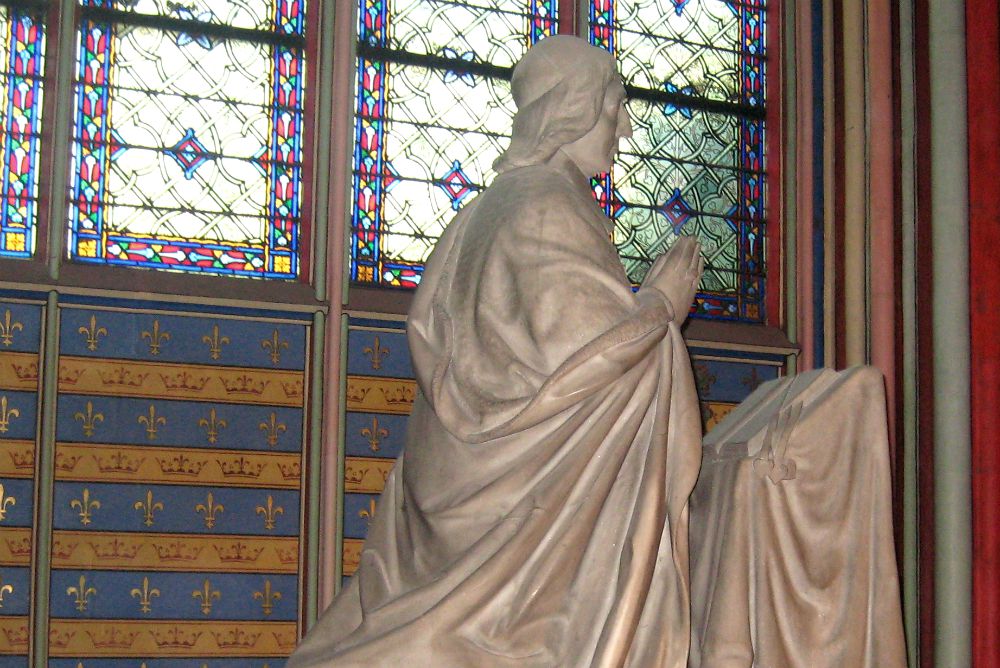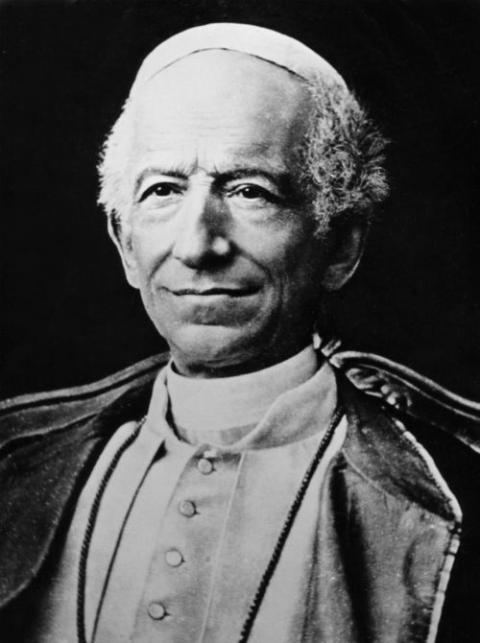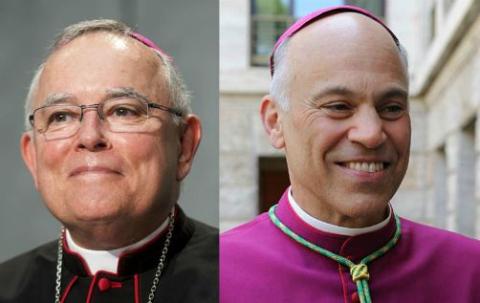
The monument du Cardinal Louis-Antoine de Noailles in Chapelle Saint-Louis in the Cathédrale Notre-Dame in Paris, France, pictured in 2007: The archbishop of Paris was involved in the Jansenism controversies of the Catholic Church. (Wikimedia Commons/Wally Gobetz)
"We send to you by this letter a renewed expression of that good will which we have not failed during the course of our pontificate to manifest frequently to you and to your colleagues in the episcopate and to the whole American people, availing ourselves of every opportunity offered us by the progress of your church or whatever you have done for safeguarding and promoting Catholic interests." These are the opening words of the encyclical letter Testem benevolentiae nostrae (English version here), sent by Pope Leo XIII to Cardinal James Gibbons on Jan. 22, 1899. The upbeat opening soon gave way to harsher words: Leo wrote this encyclical to condemn the heresy of Americanism.
The encyclical was occasioned by a series of articles published in French by Fr. Charles Maignen, attacking a recently published biography of Fr. Isaac Hecker, founder of the Paulists. The original biography had appeared with an imprimatur from Archbishop Michael Corrigan of New York, the leader of the conservative party in the American hierarchy, with an introduction by the Archbishop of St. Paul, Minnesota, John Ireland, the leader of the liberal party. The American constitutional framework, however, in which church and state were separated, was still unwelcome in Europe, where the forces of reaction had gained steam in the waning years of Leo's long pontificate. Hecker's different approach to religious life seemed another unwelcome innovation.
Not since the battle over Americanism (and soon thereafter, a related battle over Modernism) has there been a real fear that part of the U.S. Church could slip into schism. This week, however, we saw some bishops falling all over themselves to praise the integrity of Archbishop Carlo Maria Viganò. The former nuncio had just published a self-serving, score-settling, gay-bashing dossier that contained within its 11 pages repeated violations of the pontifical secret on a scale previously unheard of. Viganò had also cast aspersions against fellow bishops, but that did not deter his fan club. And this man, who had for years been given a place of honor at ecclesiastical events as "the personal representative of His Holiness," called on His Holiness to resign because, Viganò alleged, he had lifted sanctions against former Cardinal Theodore McCarrick that Pope Benedict XVI had allegedly enacted by demonstrably never applied.

Pope Leo XIII, b. Italy March 2, 1810, pictured in an undated photo (CNS/Library of Congress)
Bishops Joseph Strickland, Robert Morlino and Thomas Olmsted, and Archbishops Charles Chaput and Salvatore Cordileone all managed to mouth praise for the nuncio and his integrity and honesty, without a word of consideration for Pope Francis. Cordileone was the most effusive:
I came to know Archbishop Viganò well during the years he served as Apostolic Nuncio here in the United States. I can attest that he is a man who served his mission with selfless dedication, who fulfilled well the Petrine mission entrusted to him by the Holy Father to "strengthen his brothers in the faith," and who would do so at great personal sacrifice and with absolutely no consideration given to furthering his "career" — all of which speaks to his integrity and sincere love of the Church.
Not one word about the pope. Not one word.
Cordileone and the rest are, in a sense, already in schism. They live in what we can call the "EWTN bubble," in which a kind of conservative American ethical and political attitude is presented as orthodox Catholicism. Just as people who only watch Fox News live in a news silo, an alternate reality, in which, for example, Hillary Clinton was the candidate in cahoots with the Russians, people who watch EWTN are consistently presented with a version of Catholicism that is distorted. Over time, someone who watches EWTN and Fox will have their sense of the credible shift: What most of us would question as extreme, and therefore demanding some skepticism, becomes routine and regular. The guest commentators seek to outdo each other in getting everyone worked up. A tweet becomes proof. People who voice skepticism are dismissed as RINOs ("Republicans In Name Only") or "Catholic lite." Pretty soon, Donald Trump is the smartest president ever. Pope Francis dabbles in heresy. Such sentiments become believable.
EWTN is now the parent company of the National Catholic Register, whose Rome correspondent Edward Pentin, is one of the chief architects of the anti-Francis commentariat. Raymond Arroyo hosts EWTN's lead show, "The World Over," and it can charitably be said that he is more likely to have guests who are sympathetic with the politics of Donald Trump than with the social teaching of Pope Francis. And, increasingly, the line between EWTN and the more fringe rightwing outlets such as LifeSiteNews or Church Militant is porous and indistinct. Those of us who swim in these waters regularly can miss the big picture sometimes. As I noted yesterday, I had one of those "out of the mouths of babes" moments when a reporter for a secular newspaper who was unfamiliar with the religion beat asked me, "Is EWTN the parent company of LifeSiteNews?"
Regrettably, the bishops who came out in support of Viganò are all only too comfortable with the EWTN agenda. It has been their agenda. They want the culture wars. They like the gay bashing — which is really just weird when you think of some of the bishops in question. They express shock at the negative news coverage the president receives. Fr. Antonio Spadaro nailed it, he nailed them, when he wrote about the Catholic integralists who, teaming up with evangelical fundamentalists in the political realm, subordinated Catholic social teaching to conservative political objectives. As I explained at the time, in their criticisms of Spadaro's essay they only showed how right he was.
Advertisement
What is happening in our church in this country is similar to what happened to the Republican Party. In the late 1960s, Richard Nixon adopted the "Southern Strategy" to entice conservative southerners angry about Civil Rights legislation into the ranks of the GOP. Back then, remember, Jacob Javits was a Republican Senator from New York! Through the Ford, Reagan and both Bush presidencies, GOP leaders skated a fine line, throwing some red meat to the increasingly conservative and assertive base of the party while preaching post-racial healing when elected. Sometimes that fine line was a razor's edge: The same President George W. Bush who went to a mosque in the days after the terrorist attacks of Sept. 11, 2001, had, the year before, allowed his campaign to do robocalls in South Carolina that called Sen. John McCain's adopted daughter from Bangladesh McCain's "illegitimate black child."
Throughout those years, Republican leaders knew they had to feed the beast, but they assumed the beast would not eat them. It was one thing to work to secure the vote of racists and white nationalists, but you wouldn't want to empower them such that they could take over the party. Then, in 2016, it happened. Donald Trump figured that if no one else wanted to ride the tiger, he would. And it worked. Two years later, a defanged GOP establishment has been pulled so far into derangement syndrome — even conniving at the president's dalliance with a foreign power at the expense of U.S. intelligence services — that Michael Gerson, a voice of conscience and reason, has concluded that the only way for the Republican Party to survive is to lose and lose big in the upcoming midterm elections.
Has not something similar happened in conservative Catholics circles? Has not the siloed and agitated conversation, the whispers of heresy, the gasping, flailing recognition that they have lost the culture wars, and — most of all — the fear that the church they felt they owned has in fact been called by the Holy Spirit into new pathways and different directions, has not all this created an EWTN bubble in which it is acceptable for a bishop to affirm his loyalty to an ex-nuncio and not to the pope himself? Again, I refer you to the actual headline at the Register when the Viganò story broke: "Ex-Nuncio Accuses Pope Francis of Failing to Act on McCarrick's Abuse." Except Pope Francis is the one who demonstrably acted against McCarrick. There will be no video of Francis, on the day of his retirement, greeting McCarrick with a warm smile as Benedict did.

Archbishop Charles Chaput of Philadelphia, pictured 2014, left, and Archbishop Salvatore Cordileone of San Francisco, pictured 2013 (CNS/Katarzyna Artymiak, Massimiliano Migliorato)
It is not only liberal Catholics who recognize how wrong-headed these attacks on the pope are. Jim Towey, the president of Ave Maria University, a man who is about as conservative as they come, issued a blistering denunciation of the pope's critics. "At a time when the Church is roiled by scandal occasioned by so many within the hierarchy who failed us, personal attacks against the Vicar of Christ and calls for his resignation are wildly divisive and patently wrong," Towey said. "Those so-called conservative Catholics who now challenge the Holy Father's legitimate authority and openly undermine his papacy, are betraying their own principles and hurting the Church they profess to love. They should stop now."
What is interesting about the comparison with Pope Leo's condemnation of Americanism is that the relationship of ideology and ultramontanism is now reversed, adding another layer of weirdness. In 1899, Leo framed his central concern about the American Church in this indictment:
The underlying principle of these new opinions is that, in order to more easily attract those who differ from her, the Church should shape her teachings more in accord with the spirit of the age and relax some of her ancient severity and make some concessions to new opinions. Many think that these concessions should be made not only in regard to ways of living, but even in regard to doctrines which belong to the deposit of the faith. They contend that it would be opportune, in order to gain those who differ from us, to omit certain points of her teaching which are of lesser importance, and to tone down the meaning which the Church has always attached to them. It does not need many words, beloved son, to prove the falsity of these ideas if the nature and origin of the doctrine which the Church proposes are recalled to mind.
Today, it is American conservatives who resist the "new opinions" that Pope Francis has brought to the fore in his exercise of the Petrine ministry. Their devotion to the papacy, once their calling card, is now abandoned because the pope espouses some theological nuance they have been trying to stamp out as heretical innovation. Except there is nothing "new" about mercy, and it is mercy that has been the central theological principle of this pontificate.
Mercy was not much valued by the Jansenists in the 17th century, and it is positively detested by the neo-Jansenists of our time. Jansenism is a heresy and it, too, produced a schism. It was 15 years between the condemnation of Jansenism in the bull Unigenitus Dei Filius in 1713 and the submission of Cardinal Louis de Noailles of Paris in 1728. Then, some souls were led astray by the schismatics just as now some souls may be led astray by the neo-Jansenists supporting Viganò. Make no mistake: This is not about protecting children or vulnerable adults from sexual predation. The people defending Viganò shared the conservative theological critique of Francis that was dying out for lack of traction. They were calling for the resignation of Cardinal Donald Wuerl before the Pennsylvania grand jury report was released. They have been stoking the flames of anti-Francis fervor on EWTN and in the pages of First Things and at conferences sponsored by the Napa Institute long before Viganò was sacked as nuncio. What this week showed is that they see no downside in coming out of the closet and demonstrating for all to see and without ambiguity where their loyalties lay. Now we know beyond any shadow of a doubt. How lucky they are to have a pope who is so committed to mercy.
[Michael Sean Winters covers the nexus of religion and politics for NCR.]
Editor's note: Don't miss out on Michael Sean Winters' latest: Sign up to receive free newsletters and we'll notify you when he publishes new Distinctly Catholic columns.







